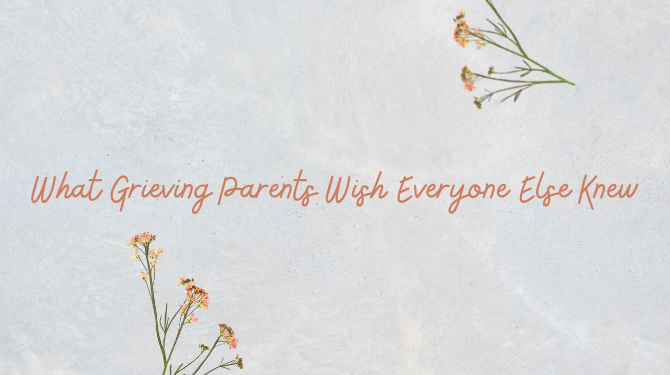
What Grieving Parents Wish Everyone Else Knew
By: Michelle L. Cramer
I’ve been doing bereavement photography for 15 years, working specifically with families who have medically fragile children or who lose a child at birth. Because I am not the type of person that can just walk away from someone in their hardest moments, the photography services I began providing so long ago easily morphed for me into ongoing support, too. This also eventually led to me obtaining certification in grief recovery.
What I’ve observed over such a long time working with these families is that society in general doesn’t know how to handle them. The cultural norms for how we respond to grief do more harm than good. Changing how we approach someone grieving has become an unexpected passion of mine. Repeatedly, families I serve have expressed a desire for society to have a better understanding of what they need. And the reality is, each of us will grieve tremendous loss at some point in our lives; having the right support to get us through is critical.
Grief is Uncomfortable
One of the first things I hear from someone grieving is that they refrain from mentioning their loss, apologize to others if found crying, or downplay their grief because of how uncomfortable it makes other people. Parents who have lost an infant child don’t share pictures because it’s too hard for others (meanwhile, the pictures are all they have). They notice that no one mentions their child’s name for fear of upsetting a grieving parent, but all they want people to do is acknowledge their child existed.
Though few will admit it, being present with someone grieving makes us uncomfortable because we want to take their pain away, fix it, and make them feel better so badly that we can’t stand to say and do nothing. Grieving parents then temper their grief for the sake of others, which often leads to further emotional harm.
Those wishing to help grieving parents would do better to meet them in their grief. Acknowledge the pain they are feeling without trying to make it better or bring relief, because you can’t. Most grieving parents just need someone to be there for them in the midst of it.
Throw Away Expectations and Timeline
It will get easier with time is something grieving parents often hear from those attempting to support them. The implication, then, is that over time it won’t hurt anymore. But this is not reality. In fact, grief has no timeline. It never leaves us, we just learn to build life around the scar that will always remain. Even years later, grieving parents will be ravaged by unexpected tsunamis of grief. They need to feel safe to experience that with those they care about.
It’s also important to understand that everyone grieves differently. There should be no expectations on a grieving parent in how they process that grief, unless they are harming themselves or others. Rather than trying to correct their approach, we should meet them in their dark places and hold them until they can stand on their own.
Platitudes are Not Helpful
The most common things to say to a griever are far from helpful in any fashion. I’m sorry for your loss has now become vacant and meaningless to most – grieving parents often tell me that this phrase feels more like others are using it to segway out of the uncomfortable conversation about a child that died, and their lack of understanding in how to handle a grieving parent.
There’s a reason for everything may actually be true, but saying it to a grieving parent isn’t helpful. It is using logic to address an emotion, which will never work. If a grieving parent knew the exact reason that their child died, and could see how this would have a ripple impact on the world with positive outcomes, would that “purpose” make them stop grieving and missing their child? Not a chance. Reason and logic have nothing to do with it.
It could be worse minimizes the parents’ grief, implying that their child wasn’t all that important. At least you have/can have more children indicates that the child they lost is replaceable. Even if they do have more children, that does not replace the child that died and do not make the grief go away. If anything, the grief remains ever present as their other children grow, milestones serving as joyful moments and gut-wrenching reminders of what the child they are missing will never experience.
You deserve happiness again leaves grieving parents feeling guilty, wondering why their child didn’t deserve it. And even let me know if you need anything leaves it up to the griever to figure out what they need and take initiative to ask, both of which can be impossible in the midst of grief.
What is Truly Needed
It’s not platitudes and magic words that bring healing. It’s not logical explanations or perspective. What grieving parents need is simply for those supporting them to be honest: I don’t know what to say. I don’t know how to help. But I am here, in whatever capacity you need for as long as you need me. Change the phrase let me know if you need anything to an action-taking statement of how can I help? This indicates that you are fully engaged and committed to doing whatever that grieving parent needs, right here, right now. Most of all, give grieving parents space to grief however they need to for as long as they need to, without analysis, platitudes or attempts to fix it. Be the solidity when they are faltering; gentle arms to catch them when they fall so they don’t shatter all over again.

About Michelle L. Cramer
Michelle is the founder and executive director of On Angels’ Wings, a nonprofit organization that seeks to improve the mental health and wellness of families with medically fragile children, or who have lost a child at birth, through free therapeutic photography and grief recovery services. Michelle is an Advanced Certified Grief Recovery Method Specialist, and author of Unshattered Grief: Helping others through loss without breaking them… again. She resides in Springfield, Missouri with her husband of 20 years, their two teenage boys, and a menagerie of 12 pets and 75 houseplants in their urban home.
